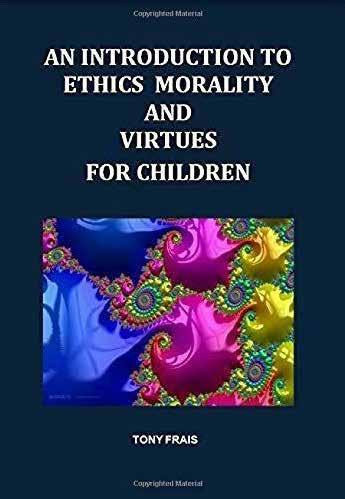
14 minute read
An introduction to ethics morality and virtues for children (March 2019) by Tony Frais
by Synergy
This article details a course designed for teachers that allows children to explore the concept of morality and virtue within primary education and is written by the author and not by NAPE.
The price of the book is £10 and is available from Amazon books and other online booksellers.
Advertisement
Research from the University of Birmingham: The Jubilee Centre for Character and Virtues (2013) has found that 84% of UK parents believe that teachers should encourage good morals and values in their pupils. The results of this research are not surprising. Most parents would like to see their children flourish in life and instilling the knowledge and importance of practical ethical, moral and virtuous behaviour can help children achieve this. Virtue and acting virtuously is about thinking and doing what is right and avoiding what is wrong. Virtue is also defined as a personality trait; an inclination to act, desire, and feel that which involves the exercise of good judgment and leads to a recognizable human excellence and doing well in life. We are not born with a fixed character. It is, we suppose, partly up to ourselves what character traits we acquire; those which help us to make the most of our lives are the virtues; without them, we cannot prosper. Children are potentially (if not actually) moral subjects. The aim of the course is to instil an introduction to how they can achieve a moral responsibility for themselves. This practice is considered important in positively contributing to a child’s good character and self-esteem. It is our own responsibility in seeing to it that children are taught the meaning of being a good character by practicing the virtues i.e., the ability to know what is good, to want what is good, and to do good. In designing this introduction course, the major objectives were to make it teacher and pupil friendly, and to keep it short enough for each subject to be taught and then discussed by the pupils within a morning or afternoon session. The first task was to conduct a systematic literature review. Well over 150 academic articles and websites devoted to promoting the teaching of ethics morality and virtues to children were reviewed including original works by prominent philosophers such as Aristotle. Sixty-seven of these articles were eventually referred to in the course’s bibliography.
The task then was to condense the contents of all these articles into a relatively short introduction course with sufficient information to cover the basic premises for teaching and learning about ethics morality and virtues for both teachers and pupils. The end result combines a blend of ancient wisdom with relative references to popular culture and good examples for the pupils to think about. The course was primarily written for year 5/6 pupils. The course does not require special teacher training or the need for extensive lesson planning. Although it is a relatively short course, it serves to highlight most of the crucial points in each of the subjects to be taught in a way that children can readily understand. There are twelve subjects for the pupils to discuss: Honesty, Trust, Friendship, Courage, Loyalty, Being kind and caring to other people, Perseverance, Ownership, Gratitude, Patience, Having a sense of purpose and Doing something magnificent. The majority of these subjects are considered as virtues with two exceptions. Ownership is not usually thought of as a virtue but it does introduce children to the concept of autonomy; where children can make their own decisions about what they do with the objects they own without being controlled by anyone else; it gives them a sense of independence. The subject of Doing something magnificent is recognizing that young people have an important role to play in making the world a better place so this subject suggests ways that the children could realistically achieve something they passionately believe in; make it possible to turn their own ideas in to something that will make a big difference to peoples’ lives in a positive way. The way the course works is as follows: Each subject to discuss has teachers’ notes and a copy of the pupil’s notes. The teachers’ notes provide an easy to understand philosophical background to each subject. Teachers have the option to introduce these deeper points to the pupils if they think it appropriate. The pupils’ notes have been kept concise for ease of learning and understanding. On each of the pupil’s subject of virtue pages, pupils should first read the notes then there are questions for them to discuss with one another and then to share their opinions with the teacher. The questions are the more important components of the course as it gets them thinking. The pupils’ questions mostly ask what ‘you’ would do in a given circumstances and moral dilemmas. These questions are asking for the attitudes of each individual pupil. The pupils should discuss their understanding of each subject of virtue and discuss the possible answers to the questions with their fellow classmates who share the same table. It is suggested to do it this way as psychological research found that peer interaction is a powerful means to promote pupil learning and development. To emphasise this particular point, another piece of research found that pupils enjoyed and engaged with this peer-to-peer exercise, which brought out a surprisingly high level of moral language, understanding and moral subtlety. One example from the course is from the subject of honesty. It is emphasised that always telling the truth is the right thing to do. However, there may be occasions where lying was kindly meant. There may be circumstances where lying did no harm or was doing less harm than telling the truth would have done. The following is an extract from the teachers’ notes on honesty explaining this concept: ‘Just such a case was when the British philosopher Sir Isaiah Berlin in his eighty sixth year, was interviewed about his views on death and dying. He said that he saw no reason to believe there is a world after death. He went on to say: his father had told him that he hoped that there was a future life. In fact, when he was dying, he asked me if I thought there was going to be life after death. I said that yes, I did. That was a lie because I did not want to tell him what I really believed. So I did not tell the truth, and I don’t regret it. Since I believed that nothing would follow one’s death, why should I cause a dying father pain?’ The French philosopher Blaise Pascal, properly interpreted, got it exactly right: ‘The first rule is to speak [only] the truth; the second is to speak with discretion’.
That said, young children have yet to have experience of life in such a way that would enable them to make these sophisticated moral judgements about where and when it may be more beneficial to lie in certain circumstances. Encouraging children to always tell the truth from an early age is clearly the best way forward.’ The pupils have nine questions to discuss on the subject of honesty. As an example, two of the questions are: ‘Suppose you won a competition in your class and your teacher gave you a pencil case as a prize but you already had many pencil cases at home so you did not like the prize. If the teacher asked you if you liked your prize, should you lie and say yes to be polite to your teacher and not to hurt their feelings, or should you tell the truth and say no, ‘I do not like my prize? Do you think there can be times when it could be unkind to be honest?’ ‘How do you feel when people have been dishonest with you?’ The pupils’ pages need to be photocopied and distributed. The pupils’ pages have been limited to a single sheet of paper for ease of photocopying or printing. There is an optional extra exercise at the end of the course which is a pupil’s monthly diary. Pupils can record any virtuous action they did that month and perhaps discuss it. Aristotle believed that moral virtue comes about as a result of habit; habitually performing virtuous acts can become second nature. Aristotle concludes that whether or not we can lead a good life depends a great deal on the habits we form when we are young, in our childhood and early adulthood. By pupils recording their good actions in the diary, it would be a reminder of what they have achieved; that they may be more likely to remember and repeat these good and positive actions. It could be a good idea for the teacher to ask the pupils what they had entered in their diary at the end of the month and to talk about it. Perhaps repeating the exercise for another few months is an option. Teachers would always have the option if they wished to add further material to the subjects discussed from resources available on the Birmingham University Jubilee Centre for Character and Virtues website. Initial feedback from teachers about the course have said the philosophical background contained in the teacher’s notes has taught them something new and interesting. When asking the pupils to discuss the questions asked, the entire classroom has literally ‘exploded’ into animated discussion. The course has also been bought by parents who wish to teach their children at home. It is hoped that by giving pupils the chance to think about and discuss the contents of the course it will serve as a basic and sound foundation for them to understand the basic concepts of virtuous behaviour and how it can equip them in order to live well, to make the most of what life has to offer. With many schools on tight budgets, the aim was to keep buying the course as affordable as possible.

NATIONAL ASSOCIATION FOR PRIMARY EDUCATION in collaboration with Humanities NATIONAL ASSOCIATION FOR PRIMARY EDUCATION in collaboration with Humanities 20:20 Project and Bannockburn Primary School, London 20:20 Project and Bannockburn Primary School, London NATIONAL ASSOCIATION FOR PRIMARY EDUCATION in collaboration with Humanities Towards a Balanced and Broadly-based Primary Curriculum 20:20 Project and Bannockburn Primary School, London Towards a Balanced and Broadly-based Primary Curriculum Towards a Balanced and Broadly-based Primary Curriculum

Wednesday 8 July 2020, 4.45pm – 7.00pm With registration/refreshments from 4.15pmWednesday 8 July 2020, 4.45pm – 7.00pm Wednesday 8 July 2020, 4.45pm – 7.00pm With registration/refreshments from 4.15pm Venue: Bannockburn Primary School, Church Manor Way, Plumstead, London, SE2 0HY
Venue: Bannockburn Primary School, Church Manor Way, Plumstead, London, SE2 0HYWith registration/refreshments from 4.15pm The Conference, embracing a theme which has been always been central to debate about The Conference, embracing a theme which has been always been central to debate about Venue: Bannockburn Primary School, Church Manor Way, Plumstead, London, SE2 0HYchildren’s entitlements, has been highlighted by OfSTED as critical in curriculum children’s entitlements, has been highlighted by OfSTED as critical in curriculum The Conference, embracing a theme which has been always been central to debate about development. It will therefore be of interest to school leaders, classroom practitioners and development. It will therefore be of interest to school leaders, classroom practitioners and children’s entitlements, has been highlighted by OfSTED as critical in curriculum governors alike, with the workshops providing a window on innovation and quality in action governors alike, with the workshops providing a window on innovation and quality in action development. It will therefore be of interest to school leaders, classroom practitioners and in the primary school. in the primary school.governors alike, with the workshops providing a window on innovation and quality in action in the primary school.KEYNOTE SCHILLER LECTURE: DR. TONY EAUDE – a former Oxfordshire Primary Head, and KEYNOTE SCHILLER LECTURE: DR. TONY EAUDE – a former Oxfordshire Primary Head, and author of several seminal texts in the area of primary education. KEYNOTE SCHILLER LECTURE: DR. TONY EAUDE – a former Oxfordshire Primary Head, and author of several seminal texts in the area of primary education. author of several seminal texts in the area of primary education WORKSHOPS on the curriculum in action: . WORKSHOPS on the curriculum in action: WORKSHOPS on the curriculum in action:Naheeda Maharasingham, Head of Rathfern Primary School, Lewisham, on Naheeda Maharasingham, Head of Rathfern Primary School, LewishamSocial Action in the Primary School , on Social Action in the Primary SchoolNaheeda Maharasingham, Head of Rathfern Primary School, Lewisham, on Tina Farr, Head of St Ebbe’s Primary School, Oxford on Developing a Curriculum, Tina Farr, Head of St Ebbe’s Primary SchoolSocial Action in the Primary School as Rich in Humanity as in Knowledge , Oxford on Developing a Curriculum, as Rich in Humanity as in Knowledge Tina Farr, Head of St Ebbe’s Primary School, Oxford on Developing a Curriculum, Alison Hales, Senior Lecturer in Education, University of Greenwich, on Alison Hales, Senior Lecturer in Education, University of Greenwichas Rich in Humanity as in Knowledge Exploring History through the Local , on Exploring History through the Local Alison Hales, Senior Lecturer in Education, University of Greenwich, on Rachel Ford, Head of Bannockburn Primary School, Royal Borough of Rachel Ford, Head of Bannockburn Primary School, Royal Borough of Exploring History through the Local Greenwich, on Beyond Teaching: Experiencing the Humanities Greenwich, on Beyond Teaching: Experiencing the Humanities CONFERENCE FEE: £20 each but reduced to £15 each for two or more teachers Rachel Ford, Head of Bannockburn Primary School, Royal Borough of Greenwich, on Beyond Teaching: Experiencing the HumanitiesCONFERENCE FEE: £20 each but reduced to £15 each for two or more teachers from the same school. £10 each for students. Please see www.nape.org.uk for
from the same school. £10 each for students. Please see www.nape.org.uk for CONFERENCE FEE: £20 each but reduced to £15 each for two or more teachers booking details or contact Robert Young on rmyoung1942@yahoo.co.uk or booking details or contact Robert Young on rmyoung1942@yahoo.co.uk or from the same school. £10 each for students. Please see www.nape.org.uk07940 487628 for 07940 487628 booking details or contact Robert Young on rmyoung1942@yahoo.co.uk or 07940 487628
Widely recognised as a leader in its field (and economically priced)Widely recognised as a leader in its field (and economically priced) Widely recognised as a leader in its field (and economically priced). Christopher Jarman’s scheme for the teaching of handwriting matching the Primary Framework for Literacy Christopher Jarman’s scheme for the teaching of handwriting matching the Primary Framework for Literacy Christopher Jarman’s scheme for the teaching of handwriting matching the Primary Framework for Literacy. DEVELOPING HANDWRITING SKILLS DEVELOPING HANDWRITING SKILLS DEVELOPING HANDWRITING SKILLS Teachers Resource Book with full set of 12 workbooks and copybooks for under fives upwards Teachers Resource Book with full set of 12 workbooks and copybooks for under fives upwards Teachers Resource Book with full set of 12 workbooks and copybooks for under fives upwards. The resource Book contains 150 pages on the history of handwriting, things to do and interesting facts about the subject. There are 51 photocopiable copy pages. The resource Book contains 150 pages on the history of handwriting, things to do and interesting facts about the subject. There are 51 photocopiable copy pages. The Resource Book contains 150 pages on the history of handwriting, things to do and interesting facts about the subject. There are 51 photocopiable copy pages.




The complete set costs £65.00 (£55.00 for NAPE members) and includes:The complete set costs £65.00 (£55.00 for NAPE members) and includes:The complete set costs £80 (£72.00 for NAPE members) and includes:

1. A Resource book for teachers – available separately at £30.00 each 2. Six copy books – available separately at £4.00 each 3. Six photocopiable work books – available separately at £3.00 each3. Six photocopiable work books – available separately at £3.00 each 1. A Resource book for teachers – available separately at £30.00 each 2. Six copy books – available separately at £4.00 each 3. Six photocopiable work books – available separately at £3.00 each3. Six photocopiable work books – available separately at £3.00 each 1. A Resource book for teachers - available separately at £30.00 each 2. Six copy books - available separately at £4.50 each 3. Six photocopiable work books - available separately at £4.00 each P&P on all orders £5.00 for orders up to £50 and £8.00 for larger orders. AllAll prices prices include include post post and and packingpacking For a sale or return pack NAPE at 01604 647646 or FREEPOST NAPE MID 24319 Moulton, Northampton NN3 7BR For a sale or return pack NAPE at 01604 647646 or FREEPOST NAPE MID 24319 Moulton, Northampton NN3 7BR contact: contact: Email Email nationaloffice@nape.org.uk nationaloffice@nape.org.uk












